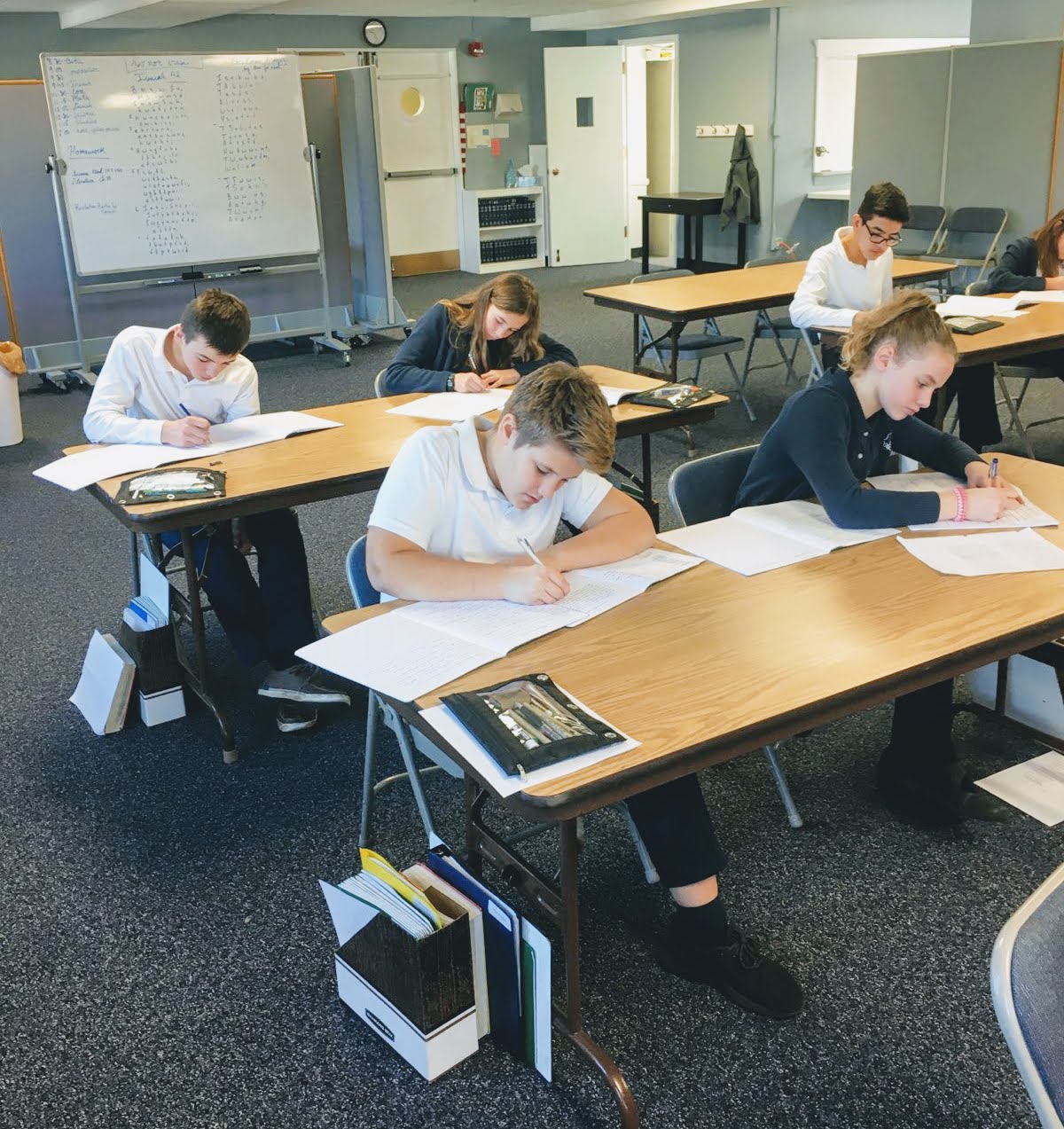Many students are moving to online learning who may never before have attended an online meeting, especially for the purposes of receiving instruction or carrying on an academic discussion with others.
Because of this, we’re providing this Etiquette Guide to help students know how to conduct themselves appropriately in an online meeting.
While many of these guidelines may seem obvious, a new medium of communication can tend to throw off some of our instincts for proper etiquette, so we thought it would be helpful to provide a baseline of expectations from which teachers can draw as they work to develop an ideal online atmosphere for learning.
1. Be on time.
Punctuality is especially important for online meetings, because we are working in the absence of normal checks to ensure that everyone can be gathered to start classes on time.
When teacher and students are in the same room together, the teacher can call everyone to attention or beckon someone in from the drinking fountain easily. This is not the case with online meetings, so students will need to be extra responsible to schedule their day effectively.
Some helpful tips for being on time include using a calendar app of some kind and scheduling reminders 15 min ahead of time or some other increment of time that will best help you.
Find a system that works for you that enables you to join the meeting the minute it begins, so you don’t miss out on those crucial first minutes of instruction.
2. Wear proper attire.
Learning from the comfort of your home can make it feel desirable to dress down, but we want to make sure we are looking presentable and professional for each other, just like we do at school. While Students may not be required to wear the uniform they did to school to online meetings, but it is our expectation that students dress in a way that is modest, clean, and avoids any unnecessary distraction.
Unless you are ill, you will be expected to share your screen through video in order to engage in discussion, so please dress well. Sleepwear and anything that could be perceived as immodest should be avoided. If you have any questions about proper clothing, have a conversation with your parents. It’s always better to be overdressed.
3. Choose a good location.
As parents and students plan for online lessons, it will be important to think through an ideal location. The most important thing is to have a clean and non-distracting background. If a student must work in their bedroom, make sure the bed or decorations are not prominent in the background. If possible, set up a desk with materials ready and a neutral background.
(Check out our 5 Cozy Reading Nook Ideas for Children!)
Another factor is the possibility of background noise. If siblings are at all likely to be loud in the room, try to isolate yourself. If your parents have a headset that you can borrow, this will make your situation much more flexible. As much as possible try to make sure nothing from your location becomes a distraction to others in the class.
4. Mute yourself if you experience unavoidable background noise.
If for reasons beyond your control noise becomes a problem in what you thought was a quiet space, please click the icon on the bottom left that will mute your audio. Try to do this sooner rather than later, and either ask family members to move or else move yourself.
If it’s impossible to find a quiet place in your current family scenario, it’s still important for you to attend the meeting. Just mute yourself for the whole time, except when called on, and let your instructor know by a private chat message what the situation is.
5. Be ready to take notes.
While teachers may have different instructions in different subjects and scenarios, online meetings aim to condense the time that everyone is present together.
So in many cases it will be beneficial for you to be able to jot down a note on the instructions the teacher is giving or important information he or she is sharing with you. While you can always ask later by email or another means of communication, or check the recording of the video, this can be time consuming. It will often be helpful to be on the look-out during the meeting for what you need to know to complete the next assignment well.
{{cta(‘1d62f401-2ba4-4f71-9a55-bdf2f19c1006′,’justifycenter’)}}
6. Give your full, focused attention.
It goes without saying that giving your focused attention is one of the best things you can do to learn efficiently. However, when on an online meeting it may be tempting to use another device or engage with someone or something else in your surroundings rather than the meeting that you are a participant in.
Giving eye contact to the screen is a good way to show your instructor that you are attending, unless of course you are taking notes. Side conversations with other students via another means of communication are definitely off limits. Show respect to the important learning process that you are engaged in during the Zoom meeting, just as you would if you were present in person with your whole class.
{{cta(‘e2e4ad74-3891-4d00-bceb-bcbbb9b8566d’,’justifycenter’)}}
7. Participate fully.
Participating fully may look different depending on what your teacher is expecting of you at any particular moment. At times, your teacher will be leading the class in a discussion and this is when it is most important to speak up and share your thoughts. Of course, if your teacher is simply sharing instructions with you, then participating fully means paying close attention to be sure you understand, writing anything down you don’t want to forget, and being ready to ask any questions you have about confusing parts when the teacher is done.
The fact is that the nature of an online format may increase the tendency of some students to sit back and observe. When there is a glowing screen in front of us, we can default to passive spectator mode. Even if it’s just taking notes, make the most of each online meeting by becoming as active a learner as you can be.
8. Don’t dominate the discussion.
For some students the reticence of others and their natural talkativeness may lead them to participate too much. In this case these students should adopt some strategy to make sure they are giving others a chance to discuss, who may need more of a pause in between comments. It’s okay for there to be a little bit of silence in an online class; you don’t have to fill every void with a comment or a thought just because it comes to you.
A strategy that may be helpful is counting how many people have spoken since the last comment you shared. If that number seems to average in the 4-5 range or higher, you’re probably doing fine, even if you’re still sharing more than others. However, if your number is averaging in the 2-3 range, or even as low as 1, you should definitely hold your thought more and let others share before contributing again. Obviously, if the teacher or another student asks you a follow-up question right after your comment, that doesn’t need to count, but the point still stands.
9. Do ask questions.
Connected to these thoughts on participation is the importance of asking questions during an online meeting. Your teachers are there to support and help you, and it makes it easier on everyone if you can ask a question while together in an online meeting. If you are experiencing some confusion or have a question about something, it’s likely that someone else has that same question. Speak up!
Your teachers will be adjusting to the new medium of communication just like you, and it may be that they jump over a crucial detail, as they are focusing on so many new dynamics. It will only help the process of transition if you ask the questions that are occurring to you along the way.
Of course, if a teacher is in the middle of an explanation or a thought, then you may want to jot the question down as a reminder to yourself or type it into the chat box for the teacher to see. It’s always possible the teacher is about to address your question, so we don’t want to go to the extreme of constant interruptions. But in general, view an online meeting as the prime time to ask questions that the whole class will benefit from.
10. Be more careful with your words.
So much of our communication is built on presence with a person, including our truly incredible ability to read facial expressions and other nonverbals. We can’t always articulate what we are reading in another person’s countenance, but it informs the tone and temperature of our interactions with others in ways we don’t even realize.
When moving communication to a new medium, we need to begin by being more careful than we would otherwise feel the need to be.
While online meetings with video do allow for some facial recognition, it may be delayed or affected in strange ways by the interposition of a screen. People don’t converse in the same way through a device as they would in flesh and blood. Comment threads are a good example of this.
Classmates and teachers may have developed ways of joking or interacting with one another that rely on a base of trust and nonverbals. Taking that full-bodied gamut away may mean that comments that would have been considered funny before are now offensive. Start into online meetings with a mindset of cautious learning. We’re going to have to relearn some of our social interactions to avoid any misunderstandings and hurt feelings.
{{cta(‘8f519474-33ad-49ff-847e-3b9e654fb389′,’justifycenter’)}}
11. Review your notes and the recording later.
When possible, the teacher will share a recording of the online meeting with you and any student who missed the live meeting because of sickness or other circumstances. Keep that in mind as you interact during the meeting! But it’s also always possible that the recording will fail or there will be a glitch in the technology.
Many online platforms are likely getting their infrastructure tested by a higher volume of use than they had before. So it’s a good idea to take notes and not rely on re-watching later. Also, it can be more time consuming to have to scan through a video in search of a particular detail or instruction that the teacher gave, when you could have just jotted it down at the time.
Remember also that because an online learning meeting condenses down instruction time and live interactions with the teacher, it may be helpful to some students to use their notes and the recording for extra review of concepts that might have been difficult.
Challenging math, science or humanities ideas may not make sense on the first time through, but reviewing the recording again the next day might suddenly clarify all your questions. Sometimes our brains need time to begin wiring new neural networks, and a night’s sleep can do wonders to solidify all the basic steps and make the trickiest parts easier to understand.
12. Keep up with all assignments.
One of the challenges posed by online learning is the increased level of responsibility that students will have for their own learning. It can be tempting to put off assignments with multiple days before their due date. However, doing this once can have a spiral effect, where, because you are rushing to make up yesterday’s assignments, you now have less time to work on today’s assignments, meaning you are likely to get behind on what’s due tomorrow as well.
Avoid the panic and the feeling of constantly being behind the ball by setting up routines for yourself that ensure you are always on top of your assignments. Adopt a mindset that each day you will put in a solid day’s work on school and learning. Give yourself little breaks and set micro-goals to ensure that you keep up the motivation.
Studies show that for most people it’s more effective to regularly switch between subjects or types of work (at time increments between 30 min and 1 hour), rather than to try to power through doing the same thing for a long period of time.
Online learning provides you with more flexibility in the structure of your school day, but you and your parent should actively design a school day for yourself. If you constantly have the temptation of video games or Netflix calling you away from your schoolwork and the burden of decision to stay the course, you will find it much harder to be productive. On the other hand, if you set up bright lines and rules for yourself to get work done before play time, you will likely find online learning an enjoyable experience.
(Check out Improving Study Habit Efficiency: 9 Tips from Outside the Box!
The reason this is a such a crucial piece of etiquette is that your preparation may impact the learning experience of others. If the next online meeting is a discussion of reading, which you have failed to complete, you deprive the class and yourself of the learning that could have occurred through your thoughtful, informed comments on the text. This experience can’t be recreated or made up if it is lost due to your lack of preparation. Respect the learning of the whole class by planning your work times well and keeping up with all assignments.
13. Check your email regularly.
There are a few reasons that checking your email regularly will be important. First, your teachers will be emailing you assignments, instructions, and links to online meetings.
While they will try to keep the schedule they have announced, it is always possible that a teacher could experience a disruption of some kind that requires them to reschedule. Checking your email ensures that you will receive these notices in a timely manner and be able to adjust your schedule for the day.
It is also possible that a teacher will have to clarify something that was misunderstood or said incorrectly in an online meeting by email afterward. If you go merrily on your way with the assignment, without checking your email, you may encounter difficulties that could have been avoided.
14. Apologize for any accidental breech of etiquette.
As human beings we all make mistakes, and mistakes are even more likely when a new set of experiences and challenges interrupt our normal routine. Online learning is going to involve that sort of interruption, and no one is expected to be perfect. However, if you do break one of these etiquette guidelines—whether it’s not being on time, loud background noise, dominating the discussion, or not being prepared—come right out and apologize sooner rather than later.
Apologizing shows respect to your classmates and your teacher and indicates that you are aware of the problem and not oblivious. If you don’t acknowledge it, your teacher may have to come to you to make sure it doesn’t happen again. Make that step unnecessary by calling it out yourself.
With these guidelines in our minds, students will be well prepared to continue learning as well as possible through online means. May our God help us honor him with our minds and our actions, as we engage in Christian, classical, joyful discovery education in a different way this spring.
{{cta(‘e2e4ad74-3891-4d00-bceb-bcbbb9b8566d’,’justifycenter’)}}
{{cta(‘ece2e62d-c524-4767-9b2f-66034e64a12a’,’justifycenter’)}}





